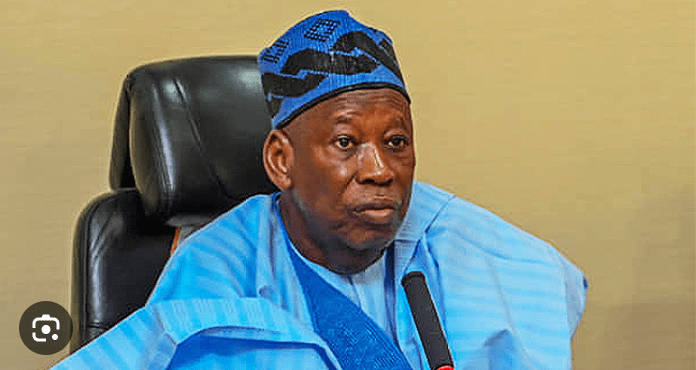The Chairman of the All Progressives Congress, Alhaji Abdullahi Ganduje, said Anambra State is not making the progress it is expected to make because it is not connected to the central government.
Ganduje, the Imo State Governor, Hope Uzodimma and other APC stalwarts are currently attending the APC South-East Colloquium in Nnewi, Anambra State.
The colloquium, focused on ‘De-marginalisation of South-East zone and integration into national politics’, is being hosted by the Senator representing Anambra South, Ifeanyi Ubah.
During the event, Ganduje expressed gratitude for participating in the dialogue that concerns the South-East region, emphasizing the importance of the Ndigbo in national integration due to their widespread presence across the country.
He also highlighted the fact that Anambra, as a strategic state in the South-East, is not making the expected progress due to its lack of connection to the central government, which has deprived the state of benefits and infrastructure.
Ganduje further pointed out that Anambra's failure to connect with the center has resulted in a lack of development and progress, stressing the importance of being represented at the national level.
He also criticized the All Progressives Grand Alliance (APGA) for its failure to grow and adapt, comparing it to the political growth in the South-West.
He expressed hope that the APC would take over Anambra and stressed the significance of Anambra connecting to the center for its growth and development.
Ganduje emphasized the importance of Anambra joining the central party and remarked on its strategic role in the Nigerian economy.
Uzodimma also encouraged the South-East to participate in the national integration of the APC.
He explained that the colloquium aims to enhance the political party in the South-East and use it to improve the region's condition.
Uzodimma expressed joy at the acknowledgment of the marginalization of the South-East by the national leadership of the APC and highlighted the need for a leader to address this issue.
“We need to find national unity, national harmony, and national togetherness so that we can have a project that includes all of Nigeria. The South-East wants a unified Nigeria where fairness and justice are the standards, and this means we must be involved in the decision-making process.
“If we are dedicated to participating in this program and advocating for the end of marginalization, it means we must join the governing political party. I believe what we need is a way to solve problems and be part of the general agreement for the entire country.
“The Nigeria project today does not accept those who are complaining, it is for those who are practical and they must take a practical approach, we must understand the political changes to navigate the situation,” Uzodimma added.
The main speaker of the discussion and the head of Nnamdi Azikiwe University, Prof. Charles Esimone, who talked about the theme, said lack of recognition and outright denial of the rights of the south-east to be part of mainstream politics have continued because the region has failed to do what is necessary.
Esimone said, “Who is excluding the South-East? The first problem is the constitution. The second is an unreliable census. Without a reliable census, there won’t be room for fairness. Fairness has the potential to calm tense situations.
“The mishandling of the three ‘Rs’ effectively set the stage for the marginalization which the South-East faces today. Federal facilities are hard to find in the South-East while cities like Zaria and Lagos have more federal facilities than the entire South-East zone.
“One of the things that has caused self marginalization is insecurity. It drives away investment into the region. Marginalization can affect groups. It can affect gender. The current political balance does not support the South-East. It does not make sense that other geopolitical zones have six states while the South-East has five.”



